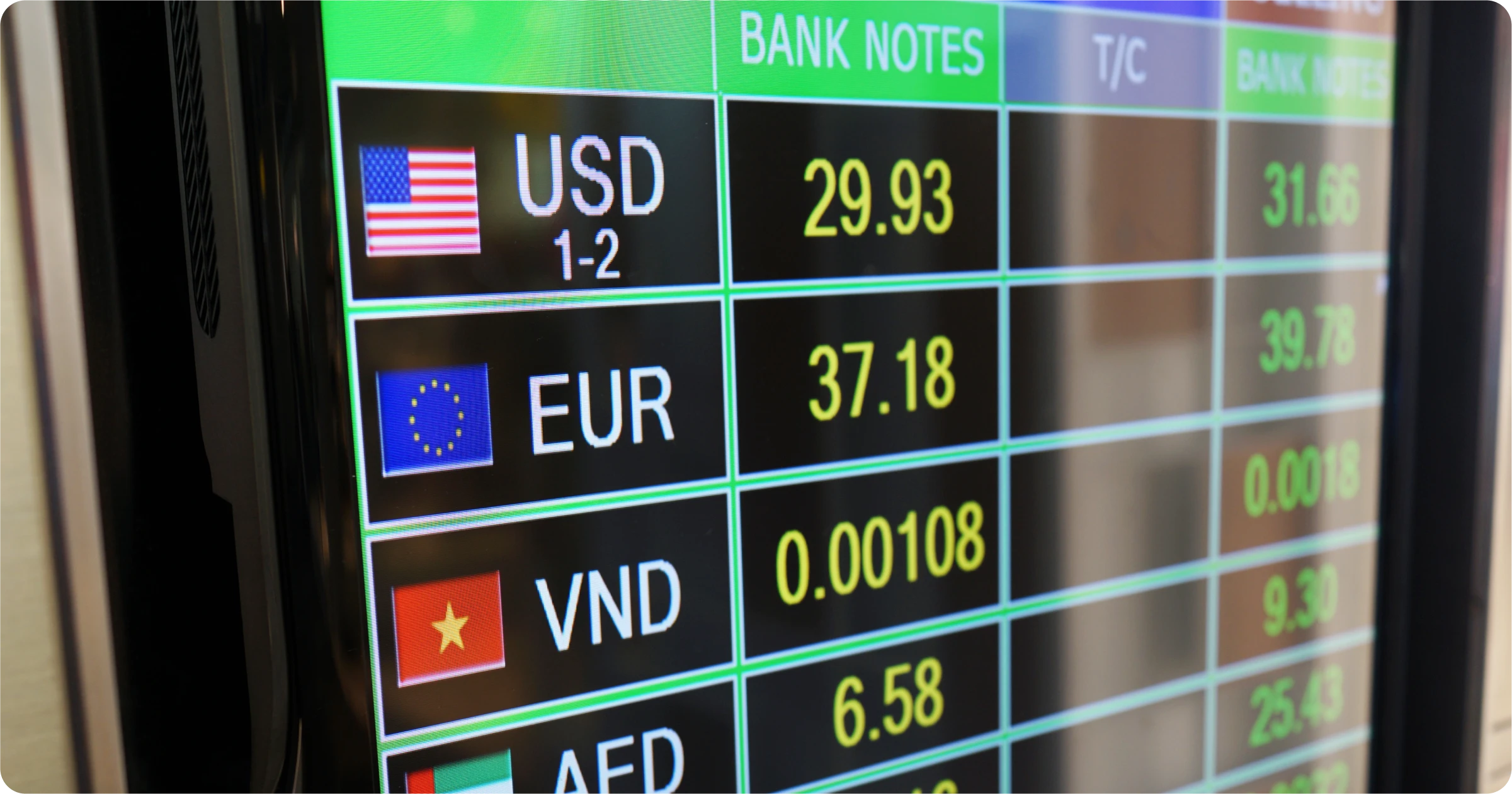🎉 Waltz reaches $50M💰 in funding to support LATAM growth 🎉 Read the full story here
Investing in U.S. real estate as a foreign national can be a powerful way to generate long-term income and diversify your portfolio. But if your income and savings are in a different currency, the real cost of your mortgage can shift from month to month.
In countries where inflation and exchange rates can swing wildly, moving money into the U.S. can feel like trying to hit a moving target. Even in more stable economies, subtle changes in currency value can have quite an impact on your returns over time.
This article explains how exchange rates work, their impact on your cost structure, and how Waltz helps foreign nationals streamline the financing and funding process for U.S. rental properties.
Exchange rates tell you how much one currency is worth relative to another. At a glance, exchange rates may appear consistent. But over the course of a year or a mortgage term, even small shifts can add up to significant costs.
Take a Canadian investor making mortgage payments on a U.S. rental property. When the Canadian dollar weakens against the U.S. dollar, each monthly payment requires more Canadian dollars. Over time, that difference can amount to tens of thousands.In countries with higher volatility, such as parts of Latin America, those fluctuations can be even more pronounced. Currency devaluation, inflation, and transfer restrictions may lead to shortfalls, delays, or extra costs when funding your investment from abroad.
When more people want to hold U.S. dollars, the dollar strengthens. When fewer do, it weakens. This dynamic affects how much your home currency can buy, and ultimately, how much it takes to fund your mortgage. Several key factors shape exchange rates, often working together in complex ways.

Central banks use interest rates to manage inflation. Higher interest rates typically attract foreign capital, since investors can earn more on deposits or bonds. As money flows into the country, demand for the local currency increases, strengthening it. That’s part of why the U.S. dollar often performs well during times of rising interest rates.
Countries that export more than they import tend to have stronger currencies. That’s because foreign buyers need to purchase the local currency to pay for those goods and services. A strong trade surplus increases demand, which can push the currency’s value higher.
Sometimes, it’s not the data itself, but how markets interpret it. Political instability, sudden policy changes, or unexpected economic reports can all cause currency values to shift. When uncertainty rises, investors may move their money into “safer” currencies like the U.S. dollar, causing abrupt changes in exchange rates.
When exchange rates fluctuate, the impact extends far beyond the cost of converting money. These shifts can influence prices, investment performance, and even housing markets, often in subtle ways that catch investors off guard.
A weaker domestic currency makes imported goods more expensive. That includes everything from cars to construction materials. If you're managing a rental property in the U.S. but paying vendors or contractors from abroad, sudden increases in costs can affect your cash flow and operating margins.
Exchange rate fluctuations can shake up investment portfolios, even ones that feel domestic. For example, if your rental property is in the U.S. but your profits are converted back into pesos or euros, the final return depends on currency value at the time of transfer. A strengthening U.S. dollar boosts your take-home return. A weakening one can cut into your gains.
Real estate markets are not immune. A weak home currency can create a “discount effect,” where U.S. properties become more affordable to foreign buyers. That demand can push prices higher in certain markets, especially in cities popular with international investors.
For mortgage holders, the most direct impact is on payments. The amount due each month stays the same in U.S. dollars, but the equivalent in your local currency changes. This makes budgeting more complex, especially in regions with inflation or currency controls. For some investors, this fluctuation can affect their total returns or ability to scale their portfolio.
Learn more: 5 Compelling Reasons to Invest in U.S. Real Estate
Most foreign investors don’t think much about currency until they start wiring money across borders. Whether you’re sending a down payment, covering closing costs, or making monthly mortgage payments, the friction becomes clear fast.
The challenges go beyond exchange rates alone:

For many foreign investors, these hurdles add up to one conclusion: managing foreign exchange is not optional. It’s essential.
That’s where the Waltz Investor Kit comes in. It includes a U.S. bank account through Regent Bank, so you can collect rental income in dollars and transfer funds into a stable currency, protecting your investment from volatility. With lower exchange fees as part of the package, moving money across borders becomes more manageable and less costly.
Exchange rates may seem like background noise, but for foreign investors in U.S. real estate, they can have a direct impact on everything from mortgage payments to long-term returns. Even with a fixed-rate loan, the value of your home currency shapes the true cost of each payment and transfer.
As we've covered, currency exchange is influenced by global forces, including interest rates, inflation, trade balances, and market sentiment. While you can’t control these factors, you can reduce the friction they cause by building a system that works across borders.
Start your investment journey with Waltz today

Fill out a quick form and we'll get back to you shortly.